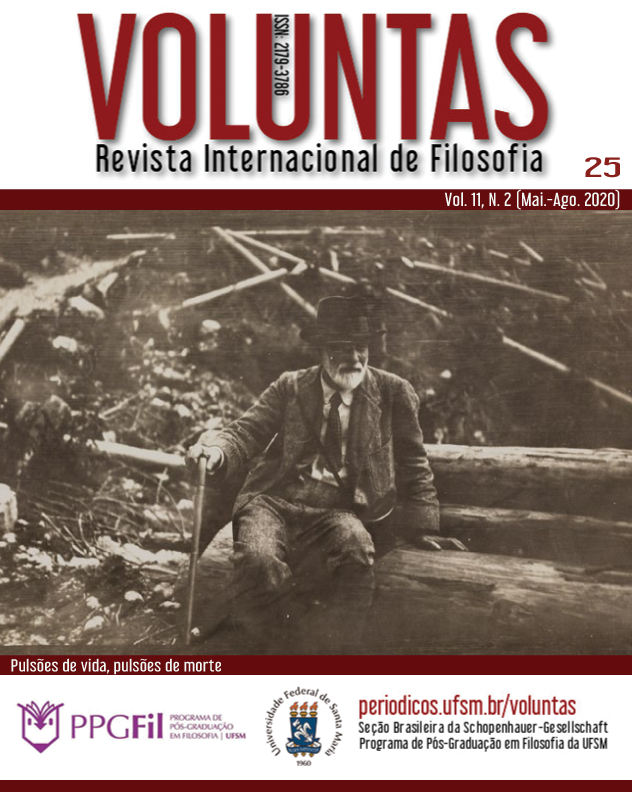Para além da pulsão de morte: absurdo e revolta em Albert Camus
DOI:
https://doi.org/10.5902/2179378647242Parole chiave:
Morte, Felicidade, Absurdo, Revolta, MoralAbstract
O objetivo desse artigo é discutir a possibilidade de uma morte feliz, e consequentemente, uma vida feliz a partir da interpretação dos pilares filosóficos de Albert Camus, a saber: o absurdo e a revolta. Enquanto o absurdo diz respeito ao confronto da irracionalidade do mundo com o desejo de clareza e racionalidade que se encontra no homem, a revolta está vinculada ao desejo inconsciente de uma moral que denominamos de moral antiteísta ou moral de atitude por mover-se consciente no âmbito das ações concretas, nascidas do sentimento da absurdidade do mundo frente à morte e o sofrimento. Testaremos, ao final, a viabilidade dessa moral antiteísta promover uma morte feliz para quem sofre e uma vida feliz, apesar de todo sofrimento, para aquele que se depara com a morte do outro. Para isso, utilizaremos como fios condutores as obras de Albert Camus: O Mito de Sísifo e A peste.Downloads
Riferimenti bibliografici
AMIOT AM, Mattéi JF. Albert Camus et la philosophie. Paris: PUF, 1997.
BRISVILLE JC. Albert Camus: vida, pensamento e obra. Tradução Portuguesa por R. Guedes da Silva. Lisboa: Presencial, 1962.
BORRALHO ML. Camus. Porto: Rés, 1984.
CAMUS A. A Inteligência e o Cadafalso e outros ensaios. São Paulo: Record, 2000.
CAMUS A. A Morte Feliz. Rio de Janeiro: Record, 1997.
CAMUS A. A Peste. Rio de Janeiro: Record, 1999.
CAMUS A. A Queda. Rio de Janeiro: Record, 2002.
CAMUS A. Calígula. Lisboa: Edições Livros do Brasil, 1993.
CAMUS A. Essais. Paris. Gallimard, 1965.
CAMUS A. Les possedes: piece en trois parties adaptee du roman de Dostoievski. Paris: Gallimard, 1959.
CAMUS A. Núpcias. Rio de Janeiro: Nova Fronteira, 1979.
CAMUS A. O Avesso e o Direito. Rio de Janeiro: Record, 1995.
CAMUS A. O Estrangeiro. Rio de Janeiro: Record, 1996.
CAMUS A. O Exílio e o Reino. Rio de Janeiro: Record, 2001.
CAMUS A. O Homem Revoltado. 6. ed. Tradução Valerie Rumjanek. São Paulo: Record, 2003.
CAMUS A. O Mito de Sísifo. Tradução Ari Roitman e Paulina Wach. Rio de Janeiro: Record, 2007.
DWORKIN, Ronald. Life’s Dominion: An Argument about Abortion, Euthanasia, and Individual Freedom. New York: Vintage Books, 1993.
FREUD, S. Análise de uma fobia de um menino de cinco anos (o pequeno Hans). In J. Strachey, Edição Standard Brasileira das Obras Psicológicas Completas de Sigmund Freud (Vol. 10). Rio de Janeiro: Imago, 1996a.
FREUD, S. A pulsão e seus destinos. In J. Strachey, Edição Standard Brasileira das Obras Psicológicas Completas de Sigmund Freud (Vol. 14). Rio de Janeiro: Imago, 1996b.
FREUD, S. O id e o ego. In J. Strachey, Edição Standard Brasileira das Obras Psicológicas Completas de Sigmund Freud (Vol. 19). Rio de Janeiro: Imago, 1996c.
FREUD, S. Três ensaios sobre a teoria da sexualidade. In J. Strachey, Edição Standard Brasileira das Obras Psicológicas Completas de Sigmund Freud (Vol. 7). Rio de Janeiro: Imago, 1996d.
GUIMARÃES, CE. As dimensões do Homem: mundo, absurdo e revolta. São Paulo: Paz e Terra, 1971.
SPONVILLE, AC. Albert Camus de l´absurde à l´amour. Roubaix, 2001.
TODD, O. Albert Camus: uma vida. São Paulo: Record, 1998.
WEYNBERG, M. Albert Camus ou la mémoire des Origines. Le point philosophique. De Boeck Université, 1996.
##submission.downloads##
Pubblicato
Come citare
Fascicolo
Sezione
Licenza
La presentazione degli originali a questa rivista implica il trasferimento, da parte degli autori, dei diritti di pubblicazione stampate e digitali alla stessa, fatta eccezione dei diritti d'autore, che per gli articoli pubblicati rimangano all’autore, con diritti periodici sulla prima pubblicazione. Gli autori possono utilizzare gli stessi risultati solo in altre pubblicazioni che indicano chiaramente questa rivista come pubblicazione originale. Poiché siamo una rivista ad accesso aperto, consentiamo l'uso gratuito di articoli in applicazioni educative, scientifiche e non commerciali, a condizione che venga menzionata esplicitamente la fonte.






